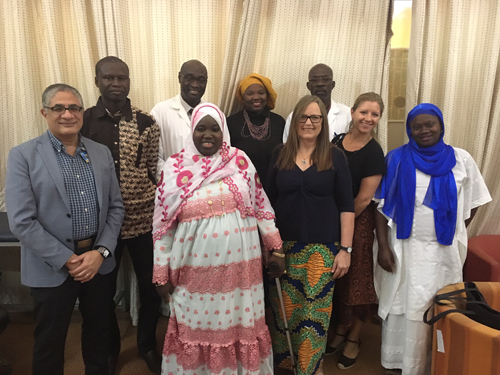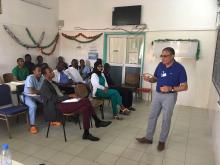Dispatches from the Africa Mercy: 2020
 Dakar, Senegal
Dakar, Senegal
March 4th, 11:20 p.m.
Relationships
Pediatric surgery is a small community. It really is. Sometimes it feels like every pediatric surgeon is just a few degrees of separation away from another in the world. This is how I came to plan this year’s mission with Mercy Ships.
My partner, Dr. Jean-Martin Laberge, had been invited to speak at the Francophone African Pediatric Surgical Association, where he met Professor Aloise Sagna, an academic pediatric surgeon in Dakar. Aloise had received a scholarship for foreign travel through Chain of Hope, a Belgian capacity-building organization. He decided to use this scholarship to spend 6 months with us at the Montreal Children’s Hospital in 2019. We had become friends, and he invited me to come to the Albert Royer National Children’s Hospital in Dakar to teach and operate before joining the docked Africa Mercy.
It also turns out that Dr. Albert Royer was a renowned pediatrician in Quebec. In fact, he was Chief of Pediatrics at our sister hospital, CHU Ste-Justine, for many years. He had a passion to provide care to the underserved, including the children of Senegal. To honor his commitment, Senegal named its only children’s hospital after him. Dr. Royer passed away in 2001, the same year I completed fellowship training. Almost 20 years later, a pediatric surgeon from Quebec is in Senegal working in a hospital founded by a pediatrician from Quebec almost 40 years previously. A small community.
My work is being performed through the Medical Capacity Building service of the Africa Mercy. They have been phenomenal in supporting me and helping me fulfill my mission at Albert Royer. On our first visit to the hospital, I can see that they have already formed excellent relationships with the hospital’s staff. They approach everyone at Albert Royer with love and humility. They are cognizant that we are all guests in Senegal, serving at the invitation of our hosts. This attitude is not lost on our hosts. They are welcoming and generous. It is an atmosphere of harmony and collaboration.
My first task is to run a pediatric surgery course for trainees and junior staff. In addition to medical students, there are a total of 27 general and pediatric surgery residents on the service. It is busy, yet they all seem to find the time to attend the entirety or part of the course. They are hungry for knowledge and politely tolerate hours of my not so perfect French. I speak about subjects that have very different outcomes in Montreal and Dakar – esophageal atresia, intestinal atresia, abdominal wall defects, and others. In our practice, almost all of our patients survive these conditions. In Senegal, most do not. I tailor my talks to understanding the realities and challenges faced by these young trainees and their mentors. I try to imagine what it is like to maintain motivation and enthusiasm when you encounter so many daily failures – so many patients presenting late, so many deaths due to low resources, so many conditions that defy a cure only because of where the child was born. I really can't imagine it. I am truly humbled by their resilience and persistence.
More important than the contents of the course or the value of the teaching are the relationships that are being cemented with current surgeons and future surgeons. This the most important investment – forming relationships that will allow us to learn together, to tackle challenges together, to make a difference together. Relationships that may allow another, yet unknown surgeon from Montreal 20 or 40 years from now to come back to Dakar and maybe discover what a predecessor from the same city or the same hospital did to keep the chain of friendship intact.





